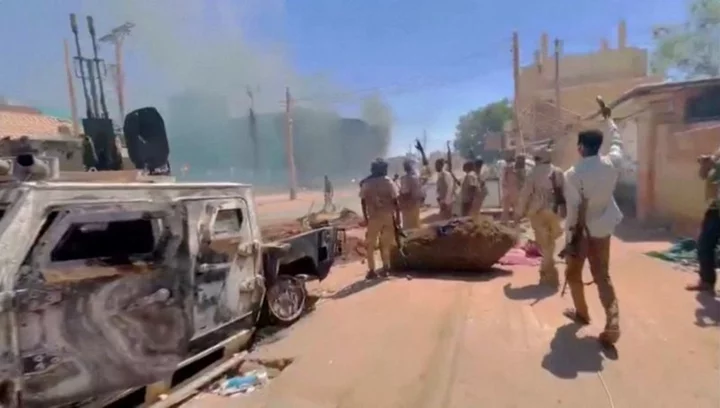KHARTOUM Sudan's capital Khartoum and sister city Bahri came under renewed air attack on Friday as the war between the army and paramilitary forces entered its fifth week, deepening a humanitarian crisis for trapped and displaced civilians.
Mass looting by armed men and civilians alike is making life an even greater misery for Khartoum residents pinned down by fierce fighting between the regular military and paramilitary Rapid Support Forces (RSF), witnesses said.
The conflict has displaced an estimated 843,000 people within Sudan and put around 250,000 to flight into neighbouring countries, the United Nations refugee agency said on Friday.
Army chief General Abdel Fattah al-Burhan took the long-anticipated step on Friday of removing RSF chief Mohamed Hamdan Dagalo, better known as Hemedti, from his post as his deputy on the ruling Sovereign Council.
The two had run the council since 2019 when they overthrew strongman President Omar al-Bashir amid mass protests against his rule, before staging a coup in 2021 as a deadline neared to hand power to civilians for a transition towards free elections.
There has been no breakthrough in Saudi- and U.S.-sponsored ceasefire talks in the Saudi city of Jeddah.
At an Arab League meeting there on Friday, a statement by Sudan's envoy accused the RSF of looting and rape, and of violating a succession of ceasefires.
"We trust that you will stand by the Sudanese army and will accompany us in the next step of reconstruction," envoy Dafallah al-Haj added.
The RSF has accused the army of starting the conflict and violating ceasefires. It says that those who have committed crimes are wearing stolen RSF uniforms.
Fighting broke out on April 15 after disputes over plans for the RSF to be integrated into the army and over the future chain of command under an internationally backed deal to shift Sudan towards democracy after decades of conflict-ridden autocracy.
Burhan installed Malik Agar, leader of a rebel group who joined the council in 2020 after signing a peace agreement with the government, as his new deputy, according to a second decree.
Later that day, Burhan promoted other military officers who served on the council, including appointing General Shams El-Din Kabbashi as deputy commander of the armed forces. Generals Yasser Al-Atta and Ibrahim Jabir were each appointed assistants to the commander.
'BODIES EVERYWHERE'
Air strikes on Friday targeted districts in eastern Khartoum and witnesses reported hearing anti-aircraft weapons used by the RSF. Bahri and Sharg el-Nil across the Nile river from Khartoum were subjected to air strikes overnight and Friday morning.
"On the road I saw about 30 military trucks destroyed by (air) strikes. There were bodies everywhere, some of them army and some RSF. Some had started decomposing. It was really horrible," said Ahmed, a young man making his way through Bahri.
The RSF is embedded in residential districts of much of Khartoum and adjoining Bahri and Omdurman, drawing almost continual air strikes by the regular armed forces.
Witnesses said the army had also started placing barriers on some roads in southern Khartoum to keep the RSF away from an important military base there.
Fighting also flared in the city of Nyala, capital of the South Darfur region in the southwest, for a second day after weeks of relative calm.
Heavy gunfire and artillery detonations went on all day in Nyala. A local market caught fire and it was difficult for those injured to get to hospitals, local activists said. They said that as of Thursday, at least 18 people had been killed.
Militia attacks and subsequent clashes in the West Darfur city of Geneina have claimed the lives of hundreds.
With the fighting has come a collapse in law and order, with rampant looting, blamed by the army and RSF on each other, hitting Sudanese homes, factories, gold markets, banks, vehicles and churches. A rapid dwindling of stocks of food, cash and other essentials has driven much of the pillaging.
"Nobody protects us. No police. No state. The criminals are attacking our houses and taking everything we own," said Sarah Abdelazim, 35, a government employee in Khartoum.
Some 705 people have been killed and at least 5,287 injured, according to the World Health Organization.
(Reporting by Nafisa Eltahir and Adam Makary in Cairo, Khalid Abdelaziz and Jana Choukeir in Dubai, Emma Farge in Geneva; writing by Nafisa Eltahir; editing by Mark Heinrich and Grant McCool)

